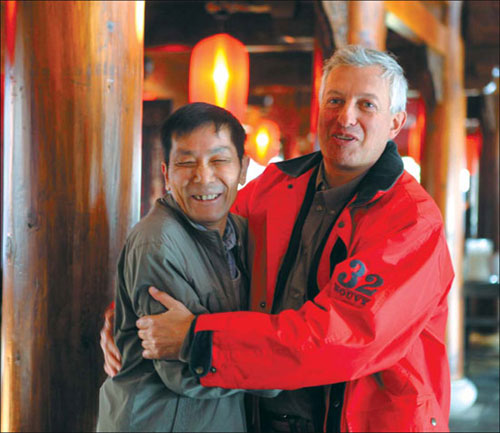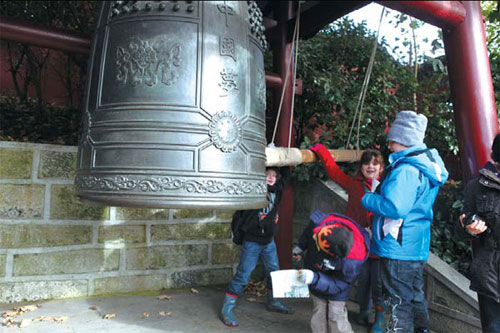
Eric Domb hugs a Chinese craftsman who helped build China Park for his Pairi Daiza zoo. Photos by Fu Jing / China Daily
A Belgian park owner has a dream to create a little piece of the Middle Kingdom in Brussels. Fu Jing learns more about his vision.
The Pairi Daiza zoo is a 40-minute drive south of Brussels, set among farmland, forest and zigzagging country roads. Zoo chief Eric Domb sees it as a platform that exhibits animals, plants and people, and also civilization manifested in eight "worlds" set out over several hectares of what he calls paradise.
His favorite among these is China Park.
Domb, who celebrated his 52nd birthday on a flight to Beijing recently, calls this section of the park "the city of immortals".
"My fascination with Chinese civilization started from infancy and I am now trying to present the symbols of its beauty in my zoo," Domb says. His aim is to make visitors feel the peace as they saunter through five hectares of Chinese temples, pavilions and winding pathways. They will be able to see red pandas, birds and alligators in one of the largest Chinese gardens outside China.
To satisfy hunger and thirst, the park also includes a Chinese restaurant and a teahouse.
More than 8 million euros ($10.2 million) were invested in the China Park and Chinese craftsmen were brought in to build it. Pairi Daiza is listed on the stock exchange, and the heavy investment has paid off, as the theme park attracts close to a million visitors each year.
Domb's fascination with China began when his mother read him Chinese fairytales. His parents also liked Chinese tea and collected Chinese arts and crafts, including poetry, ceramics and paintings.
He developed an interest in Chinese culture and philosophy, which persists to this day.
In Chinese philosophy people think about "and" instead of "either", he says. "It is not about black or white. It is about black and white. This makes a huge difference. We Westerners are always debating about left and right. Your vision of finding ways that work is very smart."
In 1992, when Deng Xiaoping first plotted a more aggressive course for China in opening up its economy, Domb had already found the land where his zoo would be built. He spent two years seeking financing for a bird park, the launching project for Pairi Daiza - Persian for "closed garden" - and opened it in 1994.
It was during a trip to the Montreal Botanical Gardens in Canada that Domb decided to build the China Park, inspired by the beauty of the Chinese gardens there.
It took him a further five years of planning before he was able to go to China and connect with Shanghai Landscape, the company that built the Montreal Botanical Garden's Chinese garden.
"I was there to invite capable craftsmen to Belgium to build the garden."
It was a bold move. Domb had no connections in China and Shanghai Landscape had only cooperated once with a company outside China, and work on the Canadian project came about only because of the strong relations between the mayors of Shanghai and Montreal.
With a recommendation from the director of the Montreal gardens, Domb persuaded Shanghai Landscape to help with the project. Work finally began on the China Park at Pairi Daiza on Aug 1, 2005.
"During these two years, I learned a lot," Domb says. "I was too direct and impatient and they taught me how to establish long and friendly relations. Now I have become good friends with many workers and bosses from Shanghai Landscape."
Dozens of Chinese staff worked on the park before it was ready to open in 2006. Domb hopes it helps people appreciate Chinese culture.
"China is not only about economy and commerce. It has very refined culture and philosophy," he says.
Domb hopes to add new aspects to the park to broaden its value as a teaching tool, and one particular aspect may be tea, which he has slowly developed an intense interest in.
"The more you learn, the more you enjoy Chinese culture," he says.
Domb intends to develop a classic Chinese village within the park where a range of traditional crafts, including calligraphy, carving and music can be demonstrated.
"When you enter the garden, you say this is China. It is true China, the DNA of China," he says.
He also plans to build a hotel in the China village in the next five to 10 years to complete the experience. Guests would then be able to eat, drink and sleep China.
But Domb's vision is not just for his guests. He wants a place where he can be at home in Europe, but still feel a connection to China.
"I am 52, and some years later, I will not be able to travel any more. Then I want to live in the Chinese garden and stay in the Chinese hotel. I want to feel I am in China."
Contact the writer at fujing@chinadaily.com.cn.

Children hit a Chinese bell in the temple at China Park, a traditional way of getting blessings.
By Fu Jing (China Daily)
